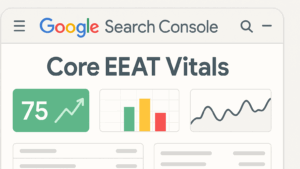This SEO question is extremely command so comes up frequently – in meetings, at events, and on online forums, like Reddit. I’ve written this answer a hundred times and this is from a recent reply to the same question posted on Reddit earlier, that I thought was worth sharing. It’s a simple question with a complex answer.
About Us: Primary Position was founded in 2004 and has worked with SaaS and tech companies like Kemp (acq: $250m 2021), IntSights (acq: 2021: $325,), Microsoft, Sage, Irish Ferries, CPL Recruitment (read our SaaS SEO Case Studies) and is also ranked first for “SEO Manhattan” and page 1 for “SEO NYC“.
Table of Contents
ToggleSEO Expert Hiring Questions on Reddit
I’ve answered this topic 100 times on Reddit about hiring SEO Professionals. The most upvoted answers I’ve given are that there are 6 major signals to look for when hiring an SEO agency or consultant:
SEO Agencies must rank
Demonstrating that the agency can rank is paramount. Early on, this point was fraught with feedback – many agencies claim they don’t have time to rank, citing the common “never look at a mechanics car”. But why can’t you? There’s nothing wrong with asking. But there’s even more to lose by NOT asking.
There are a host of “SEO Experts” that don’t even have domains. With a business owner raising a complaint every single Day in the USA about SEO providers, it makes sense to research agencies and demonstrating they can rank provides the following critical proof points that ONLY be demonstrated by ranking:
- The Agency is not penalized
- The agency can only shape existing authority
- The agency knows what they are talking about
- They can exhibit a holistic approach to SEO
SEO Agency Portfolio
In line with ranking for themselves, SEO agencies need to demonstrate that they can rank companies like yours. Having a portfolio of sites that get business is one thing but they need to provide direct contact to the third parties for real validation.
SEO Agency Reporting
This is the most common complaint from businesses that hire SEOs: they just do not understand the SEO reports, and the SEO agency is ALWAYS of the opinion that everything is fine while the owner thinks nothing is happening. Too many SEOs put too much weight in SEO audits that are really out of date in my opinion – they drown clients and SEO specialists in hours of work that at best yields “uncontested” (read: unwanted) traffic but do little in the way of making head ground on proper traffic
Keyword Research is vital
A fundamental failure of Content SEO is the basis that it operates on that says brands must educate, entertain, and constantly news-chase their audience. Thi sis almost always impossible but even if it were, it’s almost always futile. I was asked to give summary advice (in other words, I’m being asked to review vs being asked to pitch) on the SEO that a friend’s Marketing Automation Agency was working on. The agency had hired content writers from a popular Fashion agency and one of their posts was getting 1 MILLION clicks a month. And yet, their marketing automation tools were getting 0 inbound leads?
What we discovered was that the blog post was also the ONLY post getting traffic – it was unrelated to their business which was selling reports about the fashion industry but spoke to millennials about buzzwords.
It wouldn’t have mattered if they got 10 clicks or 10 million clicks: the people who buy fashion industry reports are interested in things like Import/Export Quotas for the US and EU markets which spend the most on clothing. It has nothing to do with fashion or trends. But I seriously doubt that the board understood the strategy.
Had the senior marketing team focused on keyword research from competitors – they would have been able to work on a smaller set of keywords, track their performance, and reliably predict business growth as a result.
No SEO Expert Certification
Because so many people don’t know how broad, creative, and wide SEO can be and what an SEO actually does. It’s very hard for them to assess and appoint the right SEOs. PPC can sometimes sound easier – there are certifications, and Google provides support to its paying clients directly and/or to the agency (and both at the same time), But some PPC Managers are much better, especially in specific industries or vertical types or in B2C/B2B, etc.
SEO is similar but there are no Google-approved or recommended certifications, nor is there direct Google support (and when someone claims this, dismiss them immediately. Politely but immediately. If they’re willing to lie about this, then anything is on the table).
Online Courses on SEO
There are courses that also come with certificates – but they don’t have Google’s approval. So they’re just someone’s opinion. Someone working in SEO training obviously isn’t busy at the top end of the SEO game – so are you really going to trust their course?
Top SEOs know that their strategies can be worth millions. In 2021, 3 of our clients were acquired for sums starting at $250m. In 2022, 7 of our clients were looking at preparing for $250m+ valuations. These SEO strategies don’t get shared in blog posts or webmaster forums.
The reality is that the ideal SEO expert: is somebody who has already solved the problem before.
A Process of elimination
The crux of the issue can also be viewed from the point of view – of what is SEO and what SEO needs to cover. This angle can make the process a little easier. Again, Google gives good direction – saying there are no points for completing an SEO scorecard.
Some Red/Yellow Flags to be aware of, or at least be aware of and assess accordingly:
Claims that Google helps them or they have a Google connection
As unbelievable as this sounds, I’ve had many such conversations – one in particular when I was Inbound Director at Kemp Technologies (which grew entirely due to SEO and SEM) with an SEO agency in Cincinnati that claimed to have a special relationship despite not ranking for SEO in Cincinnati (not a very challenging task either).
Their own website has little to no rank
Many experts claim the old car mechanic adage – they’re so busy fixing everyone else’s car, that they have no time for their own. This also implies that they’re not using SEO to sell either and actually therefore probably haven’t Don’t get me wrong – top-level SEO almost always requires very personal recommendations where the trust stakes and values are high. That’s because the risks and costs are high. And the only SEOs that will get that: the ones who’ve done it before.
No SERPPositions or Google Traffic
It sounds unfair – they could be great – but if they are, why don’t they have a portfolio? I don’t any artists, graphic designers, videographers, actors, journalists who don’t have portfolios, or executives who don’t have previous roles and experience.
They don’t offer anything over the standard SEO checklist
We’ve published this below – but there’s a basic belief that finding keywords and putting them into a page (like everyone else does) is somehow an optimization strategy.
They believe that they have some kind of secret sauce or create magical content
A lot of people focus on SEO myths or fear of myths, as well as vague and subjective goals – like “strong” content. Search engines can’t evaluate content (except to test if they have been machine-generated). Most myths – like the duplicate content myth or having a certain word count have all been regularly debunked by Google Search Quality engineers and team members and are easily searched for (in Google!). If they’re so easy to detect – then any SEO vendor perpetuating them has to be a red flag.
Their SEO strategy isn’t clear, predictable, and/or reliable
There’s no black magic to SEO – if the strategy isn’t clear, convincing, and rooted in logic supported by reports and Google directives, then something is wrong.
Asking the wrong questions
Anywhere you see the question asked “How do I pick an SEO expert” or “How do I pick the best SEO company” – you’ll see a list of what’s frequently called “on-site” SEO which is often a little more than this:
- Keyword Research
- On-page optimization – Title, H1, URL
- Word Count
- Schema
- Keyword inclusion or keyword optimization
If you search for any keyword – in your purview or otherwise – chances are that there will be millions of results. They all have keywords, titles, URLs, H(x) tags (essentially document headings). This is basic writing (housekeeping) – it’s not in any way optimization.
An SEO isn’t ticking off a checklist. They aren’t performing a seance. They are problem solvers. You hire an SEO to solve a problem, the same way you hire a business coach to help grow and improve a leadership team.
KPIs: Asking the right questions
- What are we missing?
- Why doesn’t this page rank?
- What are our customers looking for?
- Why will Google share us?
- How many keywords are in our Universe?
- How will we track our growth and whether it’s working?
- How can we ensure we have enough of your time?
- What SEO Tools should we use?
- How do we scale pragmatically?
- What media, platforms, and profiles do we need in our marketing mix?
- What reporting tools do we need?
- How do we track and manage attribution?
The number one answer to this: They’ve done it before. They knew how they discovered it, how they pivoted, what they had to publish, and the leading indicators that helped them navigate which elements were leading toward an increase.
Instead of focusing on a common checklist available on every SEO forum and blog post where this question is repeated – detailing a list of so-called optimizations – the SEO who can solve your problem needs to focus on your competitors and what they’re doing and how much work you need to do to overcome that.
Developing SEO Expert Authority
The challenges aren’t including keywords in a URL or Page Titles – that’s how you create a document or article or word post. The strategy is what content you need to create, why, and where did it comes from – i.e. who is asking? The strategy for creating SEO content is vastly different from the strategy for blogging or social media. You don’t have a direct route to the customer – your first customer is the search engine. If the search engine can’t understand “The top ten things to disrupt your industry in 2023” actually means “How to manage digital transformation when migrating to the Azure Cloud” – then catchy or not, it won’t work.






